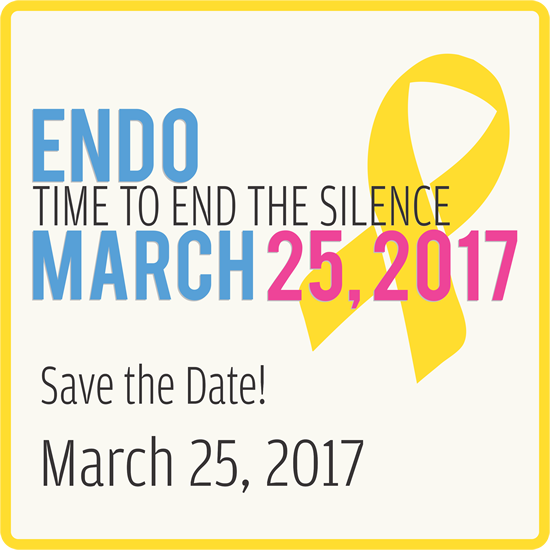
March welcomes the return of spring and the honoring of new life. In the spiritual realms, this takes place in the observation – and celebration – of spring equinox or Oestara, Easter, Naw Ruz and Holi, all of which focus on fertility, new life and rebirth. Perhaps that’s why those of us working in reproductive health designated March as Endometriosis Month. This powerful event is honored all over the world – so joining – or heading up – a march in your area connects you with millions of other women, and couples, all around the globe.
The EndoMarch serves as a reminder that not everyone is fertile – or as fertile as they’d like to be – and that fundraising and awareness are keys to circulating important information and facts. The more we know about endometriosis, and the more funding we can raise for research, the closer we’ll be to a time when endometriosis no longer effects fertility – or where it ceases to exist altogether.
What is endometriosis?
The endometrium is a blood-rich material that lines the uterus, ready to nourish an implanted fertilized egg. Every month a mature egg goes unfertilized, the uterus contracts and expels the endometrium in the form of your period. After the expired endometrium is shed, a new one is created for the next menstrual cycle.
Sometimes, for mysterious reasons, the endometrial cells get lodged elsewhere, outside of the uterus. Typically, this tissue will form on fallopian tubes or the outside of the uterus, but endometrial tissue has also been found on other pelvic organs. These extra growths are called “endometriotic implants” or lesions.
Endometrial lesions respond to a woman’s hormone cycle the same way as the endometrial lining inside the uterus does. When it’s time to be shed, additional, misplaced lesions can cause inflammation, pain and more extreme menstrual symptoms.
Symptoms of endometriosis include:
- Heavy periods or bleeding that extends beyond the norm
- Irregular periods
- Bleeding in between periods
- Severe cramping, nausea and/or lower back pain before and during your period
- Painful intercourse or pain during routine pelvic exams
- Painful urination or bowel movements, usually during your period
- More than usual fatigue, dizziness, bloating or diarrhea during your period
- Difficulty conceiving
What’s “normal?” Good question. If you feel like your periods are debilitating in any way, or seem to cause more discomfort than they do for other women in your peer group, it’s worth bringing up at your annual well-woman check with your gynecologist. We’d much rather tell you don’t have endometriosis, than have a patient living with symptoms – and potentially long-term side effects – if you don’t have to.
Here are some important facts about endometriosis:
- Endometriosis is one of the three leading causes of infertility
- 60% of women who have endometriosis will not have any symptoms at all – except for difficulty conceiving.
- It’s believed that 6.5 million women in the U.S. have endometriosis, and it affects approximately 200 million women worldwide.
The story that periods are supposed to be uncomfortable or painful (which they aren’t) perpetuates a culture where endometriosis goes largely undiscussed, and where it’s mis- or underdiagnosed. Yes, it’s true that your period can cause a low-grade level of discomfort, but anything beyond that should be evaluated by a physician.
The longer you live with endometriosis, the more likely it is for scarring to occur. This can lead to more serious complications down the road – such as infertility as the result of tubal blocks or anatomical changes that affect ovulation, conception and/or implantation of a fertilized egg.
Treatment can be as simple as going on the birth control pill in order to regulate your period. More server cases may require hormone therapy of some kind and/or may involve conservative, surgical treatment to remove endometrial lesions and any associated scar tissue. In severe cases, women may require a hysterectomy. If surgical treatment isn’t effective and the condition results in an infertility diagnosis, women with endometriosis may opt to use fertility treatments.
Read, Your Top 5 Endometriosis Questions Answered, for more information.
Get Involved in an Endometriosis March Near You
In addition to spreading the word, many communities host their own version of an EndoMarch, with the goal of coming together as a supportive network and getting the word out about one of the most common causes of infertility in the United States.
Participating in a march is a wonderful way to support friends, family members and the female sisterhood at-large who live with endometriosis. If you have endometriosis or are currently working with a fertility specialist, these marches are also a way to network and surround yourself with a supportive community.
The following are helpful links to:
Join an EndoMarch Team or start one of your own
Join the Bloggers Unite Campaign
If you’re not feeling up to it this year, that’s okay. The EndoMarch movement is gaining momentum year by year, so set up a calendar reminder for next February and take it from there.
 Patient Portal
Patient Portal
